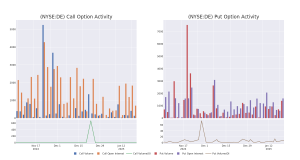
(Bloomberg) — Global stock and bond markets extended losses, hit by diminishing wagers on Federal Reserve interest-rate cuts this year and a further oil-price spike that poses a fresh threat to inflation.
Most Read from Bloomberg
MSCI Inc.’s all-country equity index slid to the lowest since September, while European stocks fell 0.8%, led lower by the technology and industrial sectors. Wall Street was set to extend Friday’s losses, with futures on the S&P 500 down 0.8%, and those on the Nasdaq 100 losing 1.3%. Tech shares including Tesla Inc., Palantir Technologies Inc. and Nvidia Corp. were among the high-profile losers in premarket trading.
A blowout US jobs report on Friday prompted traders to slash their wagers on Fed rate cuts to less than 30 basis points for the whole of 2025, while another data set showed a rise in inflation expectations. The figures sparked a selloff that wiped out the S&P 500’s year-to-date gain and sent the dollar to two-year highs.
Ten-year Treasury yields — the rate that underpins the global cost of capital — rose further to touch a 14-month high, while 30-year borrowing costs stayed just below the psychologically key 5% threshold.
“As long as the US fixed income market hasn’t stabilized, it will be difficult for the equity market to regain strength,” said Benjamin Melman, chief investment officer at Edmond de Rothschild Asset Management. “We need some stabilization, but as we are seeing this morning, it is not going to happen today.”
Energy stocks rose in Europe, however, as another wave of US sanctions on Russia sent Brent crude futures to a four-month high above $81 a barrel.
The rise in Treasury yields and the dollar is affecting markets worldwide, raising borrowing costs across Asia and Europe. UK assets, which have been at the epicenter of the turmoil, continued to lose ground, with 10-year gilt yields up another five basis points and the pound extending last week’s 1.7% slump to trade at the weakest since November 2023.
Inflation data due Wednesday could be crucial for UK markets, with MUFG Bank Ltd strategist Lee Hardman predicting that even a stronger price print will offer no respite to sterling.
“In the current market environment where the ongoing selloff in gilts is creating more concern amongst market participants over the government’s fiscal position, even a stronger UK inflation report could be viewed more negatively for the pound,” Hardman wrote.


